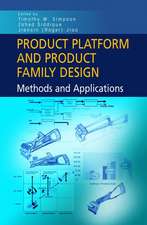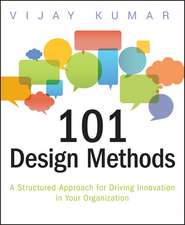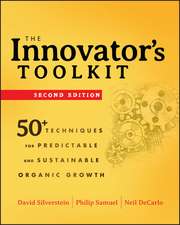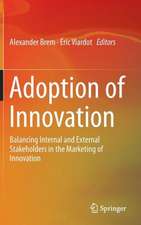Managing Science: Methodology and Organization of Research: Innovation, Technology, and Knowledge Management
Autor Frederick Betzen Limba Engleză Paperback – 27 dec 2012
| Toate formatele și edițiile | Preț | Express |
|---|---|---|
| Paperback (1) | 570.97 lei 38-44 zile | |
| Springer – 27 dec 2012 | 570.97 lei 38-44 zile | |
| Hardback (1) | 654.95 lei 6-8 săpt. | |
| Springer – 24 noi 2010 | 654.95 lei 6-8 săpt. |
Din seria Innovation, Technology, and Knowledge Management
- 15%
 Preț: 643.99 lei
Preț: 643.99 lei -
 Preț: 281.97 lei
Preț: 281.97 lei - 18%
 Preț: 954.62 lei
Preț: 954.62 lei - 15%
 Preț: 653.14 lei
Preț: 653.14 lei - 18%
 Preț: 945.62 lei
Preț: 945.62 lei - 18%
 Preț: 890.54 lei
Preț: 890.54 lei - 15%
 Preț: 640.06 lei
Preț: 640.06 lei -
 Preț: 383.93 lei
Preț: 383.93 lei - 15%
 Preț: 633.02 lei
Preț: 633.02 lei - 18%
 Preț: 1124.60 lei
Preț: 1124.60 lei - 18%
 Preț: 956.81 lei
Preț: 956.81 lei -
 Preț: 389.49 lei
Preț: 389.49 lei - 15%
 Preț: 655.13 lei
Preț: 655.13 lei - 15%
 Preț: 642.03 lei
Preț: 642.03 lei - 18%
 Preț: 941.50 lei
Preț: 941.50 lei - 15%
 Preț: 643.00 lei
Preț: 643.00 lei - 18%
 Preț: 732.52 lei
Preț: 732.52 lei - 15%
 Preț: 637.59 lei
Preț: 637.59 lei - 18%
 Preț: 890.06 lei
Preț: 890.06 lei - 15%
 Preț: 635.47 lei
Preț: 635.47 lei - 15%
 Preț: 638.57 lei
Preț: 638.57 lei -
 Preț: 391.99 lei
Preț: 391.99 lei -
 Preț: 391.99 lei
Preț: 391.99 lei - 15%
 Preț: 632.22 lei
Preț: 632.22 lei - 20%
 Preț: 584.75 lei
Preț: 584.75 lei - 15%
 Preț: 642.18 lei
Preț: 642.18 lei - 18%
 Preț: 894.16 lei
Preț: 894.16 lei - 18%
 Preț: 943.73 lei
Preț: 943.73 lei - 15%
 Preț: 644.49 lei
Preț: 644.49 lei - 18%
 Preț: 947.85 lei
Preț: 947.85 lei - 15%
 Preț: 656.89 lei
Preț: 656.89 lei - 18%
 Preț: 954.45 lei
Preț: 954.45 lei - 18%
 Preț: 1006.72 lei
Preț: 1006.72 lei - 18%
 Preț: 727.31 lei
Preț: 727.31 lei - 15%
 Preț: 642.51 lei
Preț: 642.51 lei - 18%
 Preț: 953.65 lei
Preț: 953.65 lei - 15%
 Preț: 639.59 lei
Preț: 639.59 lei - 15%
 Preț: 645.47 lei
Preț: 645.47 lei - 18%
 Preț: 952.26 lei
Preț: 952.26 lei - 15%
 Preț: 639.08 lei
Preț: 639.08 lei
Preț: 570.97 lei
Preț vechi: 713.72 lei
-20% Nou
Puncte Express: 856
Preț estimativ în valută:
109.27€ • 113.66$ • 90.21£
109.27€ • 113.66$ • 90.21£
Carte tipărită la comandă
Livrare economică 10-16 aprilie
Preluare comenzi: 021 569.72.76
Specificații
ISBN-13: 9781461427568
ISBN-10: 1461427568
Pagini: 420
Ilustrații: XXX, 388 p.
Dimensiuni: 155 x 235 x 22 mm
Greutate: 0.59 kg
Ediția:2011
Editura: Springer
Colecția Springer
Seria Innovation, Technology, and Knowledge Management
Locul publicării:New York, NY, United States
ISBN-10: 1461427568
Pagini: 420
Ilustrații: XXX, 388 p.
Dimensiuni: 155 x 235 x 22 mm
Greutate: 0.59 kg
Ediția:2011
Editura: Springer
Colecția Springer
Seria Innovation, Technology, and Knowledge Management
Locul publicării:New York, NY, United States
Public țintă
ResearchNotă biografică
Frederick Betz is a Visiting Professor, Nile University, Cairo, and Adjunct Professor, Department of Engineering and Technology, Portland State University. In 2007-8 he was a Visiting Scientist on the Science and Technology Research Council, Turkey, and from 1998 to 2005, he served as a Professor in the Graduate School of Management and Technology Management at the University of Maryland University College (UMUC). He has published 5 books, including Managing Technological Innovation (Wiley, 2/e, 2004), Executive Strategy (Wiley, 2002), and Strategic Technology Management (McGraw-Hill). He has published numerous scholarly articles in such journals as Journal of Technology Transfer, Technology Management, and International Journal of Innovation and Technology Management.
Textul de pe ultima copertă
What is science? How is it performed? Is science only a method or is it also an institution? These are questions at the core of Managing Science, a comprehensive handbook on how scientific research is and should be conducted and its results disseminated.Knowledge creation occurs through scientific research in universities, industrial laboratories, and government agencies. Any knowledge management system needs to promote effective research processes to foster innovation, and, ultimately, to channel that innovation into economic competitiveness and wealth. However, science is a complicated topic. It includes both methodological aspects and organizational aspects, which have traditionally been discussed in isolation from each other. In Managing Science, Frederick Betz presents a holistic approach to science, incorporating both philosophical and practical elements, in a framework that integrates scientific method, content, administration and application. Illustrating all of the key concepts with case studies (both historical and contemporary, and from a wide spectrum of fields), Betz provides in-depth discussion of the process of science. He addresses the social, organizational, institutional, and infrastructural context through which research projects are designed and performed, and their results applied, along the path from science to technology to economy. This theoretical and practical approach to science is the foundation of today's knowledge-intensive and technology-enabled industries, and positions the management of science within the broader context of knowledge management and its implications for organizations, industries, and regional and national technology management policies. Managing Science will be an essential resource for graduate students in all areas of research, professors submitting research proposals and performing research grants, industry scientists, R&D specialists, research policymakers and university administrators, and anyone fascinated with science in the discovery and application of knowledge.
Caracteristici
Examines the methodologies, philosophies, and techniques by which scientific research is conducted extends to both physical and social sciences, and applies to both empirical and theoretical applications Illustrates the concepts through engaging historical and contemporary examples Includes appendix with practical tools and resources for launching and sustaining successful research projects Includes supplementary material: sn.pub/extras












